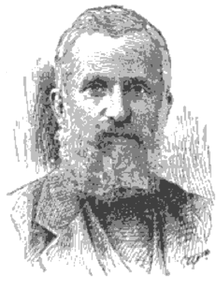| Edmund Noble | |
|---|---|
 | |
| Born | (1853-01-08)January 8, 1853 Glasgow, Scotland |
| Died | January 8, 1937(1937-01-08) (aged 84) Malden, Massachusetts |
| Occupation | Writer |
| Spouse | Lydia Lvovna Pimenoff |
| Children | 2 |
| Signature | |
Edmund Noble (January 8, 1853 – January 8, 1937) was an Anglo-American author, journalist, philosopher and editor.
Biography
Edmund Noble was born in Glasgow, Scotland, in 1853. He was the son of John and Eliza Noble who were natives of England. After the death of his father, in 1868, his mother and other members of the family emigrated to the United States in 1872, and located in Boston, Massachusetts. He was educated under the instruction of his grandfather the Rev. William George Nevatt, and in the public schools of St. Helen's, Lancashire, England. Upon completing his studies he entered the journalistic field.
Noble began his career as a reporter on the St. Helen's Standard in 1872. Later, he moved to Liverpool, where he worked on the Liverpool Courier and Liverpool City News. From 1882 to 1884 Noble was a special correspondent in Russia for various English newspapers including the Daily News, Daily Globe, Manchester Guardian and Glasgow Herald. There he met his future wife, Lydia Lvovna Pimenoff, a Russian citizen.
Noble was an advocate of emergent and theistic evolution. His evolutionary theory is outlined in his book Purposive Evolution (1926). It was positively reviewed by philosopher John Dewey, but criticized by psychologist William McDougall.
Life in the United States
In 1885 Noble and Pimenoff moved to the United States. They settled in Boston, where Noble worked as a correspondent on the Boston Herald (1885–1931). He took part in Free Russia Movement as a member of the Society of American Friends of Russian Freedom. From 1892 to 1894 he edited the monthly magazine of the Society Free Russia. He could speak the Russian language and actively supported Russian émigrés.
Most of their life Edmund Noble and Lydia Pimenoff-Noble spent in Malden, near Boston. They had two daughters, Beatrice Noble and Lydia Edmundovna Noble. The latter was a poet, who translated from Russian into English the Russian poet Balmont.
Edmund Noble died in Malden on January 8, 1937. Only his daughter Beatrice was still alive at that time, Lydia Pimenoff-Noble having died in 1934 and Lydia Edmundovna Noble in 1929.
Works
- Noble, Edmund 1886. "Imitation Among Atoms and Organisms". Appleton's Popular Science Monthly (February): 492–510.
- Noble E. - The Russian Revolt, Its Causes, Condition, and Prospects. Houghton, Mifflin & Co. Boston, 1885.
- Noble E. - "Suggestion as a Factor in Social Progress" // International Journal of Ethics. 1898. Vol. 8. № 2. Р. 214-228.
- Noble E. - Russia and the Russians. Houghton, Mifflin & Co. Boston, 1900.
- Pimenoff-Noble L.L., Noble E. - Before the Dawn: A Story of Russian Life. Houghton, Mifflin & Co. Boston, 1901.
- Noble E. - "The Objective Element in Esthetics" // The Philosophical Review. 1921. Vol. 30. № 3. Р. 271-281.
- Noble E. - "The Ways of Nature Beyond Darwinism" // The Philosophical Review. 1925. Vol. 34. № 4. Р. 380-388.
- Noble E. - Purposive Evolution: The Link Between Science and Religion. H. Holt and Company, 1926.
Further reading
- Foglesong D.S. The American Mission and the "Evil Empire": The Crusade for a "Free Russia" since 1881. Cambridge, 2007.
- Foglesong D.S. The Origins of the First American Crusade for a "Free Russia", Rossija XXI. - 2002. - № 5. - С. 100-133. Archived February 20, 2012, at the Wayback Machine
References
- Encyclopedia of Massachusetts. Biographical - Genealogical. Vol. I. Boston, 1916. P. 357
- Who Was Who in America. Vol. I. 1897-1942. Chicago, 1962. P. 901
- Eldridge, Seba. (1928). "Reviewed Work: Purposive Evolution by Edmund Noble". The Philosophical Review 37 (3): 269-273.
- ^ McDougall, William. (1929). Modern Materialism and Emergent Evolution. Methuen & Co. pp. 248-258
- Wieman, Henry Nelson; Melan, Bernard Eugene. (1936). American Philosophies of Religion. Willett, Clark. p. 243
- Dewey, John. (1927). "The Integration of a Moving World. Purposive Evolution: The Link Between Science and Religion by Edmind Noble". The New Republic 51: 22-24.
- "Nechiporuk D.M. What Americans Can Do for Russia? Propaganda of the Society of American Friends of Russian Freedom and the Magazine "Free Russia"". Archived from the original on August 18, 2011. Retrieved March 22, 2009.
- "Papers of Lydia Edmundovna Noble, 1895-1940". Archived from the original on July 15, 2010. Retrieved March 16, 2009.
- "Edmund Noble is Dead". The Boston Globe. Malden. January 8, 1937. p. 3. Retrieved August 17, 2020 – via Newspapers.com.
- New York Times. January 9, 1937. P. 17.
- New York Times. August 4, 1934. P. 11.
External links
 Media related to Edmund Noble at Wikimedia Commons
Media related to Edmund Noble at Wikimedia Commons